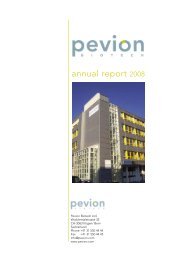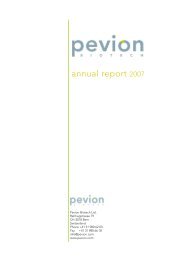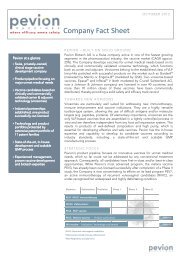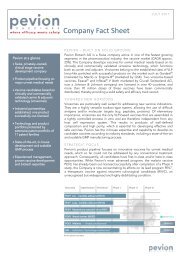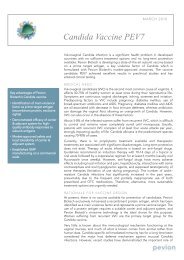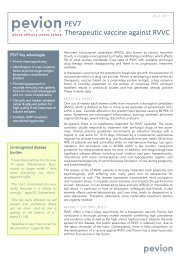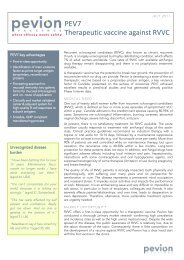ANNUAL REPORT - Pevion Biotech AG
ANNUAL REPORT - Pevion Biotech AG
ANNUAL REPORT - Pevion Biotech AG
You also want an ePaper? Increase the reach of your titles
YUMPU automatically turns print PDFs into web optimized ePapers that Google loves.
Ultrastructure of virosomes<br />
Virosomes are spherical, unilamellar vesicles with a mean diameter of 150<br />
nm. Essentially, virosomes represent reconstituted empty influenza virus<br />
envelopes devoid of the nucleocapsid<br />
including the genetic material of the source<br />
virus. Virosomes are not able to replicate but<br />
are pure fusion-active vesicles. They function<br />
as both carrier platforms and adjuvants. In<br />
contrast to liposomes, virosomes contain<br />
functional viral envelope glycoproteins:<br />
influenza virus hemagglutinin (HA) and<br />
neuraminidase (NA) intercalated in the<br />
phospholipid bilayer membrane. The unique<br />
properties of virosomes partially relate to the<br />
presence of these glycoproteins. They not<br />
only confer structural stability and<br />
homogeneity to virosome formulations, but<br />
they significantly contribute to the<br />
immunological properties of virosomes, which<br />
are clearly distinct from other liposomal and<br />
proteoliposomal carrier systems. These<br />
proteins enable the virosome membranes to<br />
fuse with cells of the immune system and thus<br />
deliver their contents – the specific antigens –<br />
directly to their target cells, eliciting a specific first-class immune response<br />
even with weak-immunogenic antigens. Once they have delivered the<br />
antigens, the virosomes are completely metabolized, whereas the<br />
conventional adjuvant aluminum stays in the body. Thus virosomes are an<br />
efficient and safe carrier and adjuvant system.<br />
PeviPRO TM<br />
PeviPRO TM is <strong>Pevion</strong> <strong>Biotech</strong>’s proprietary virosome carrier platform for the<br />
development of antigen-specific prophylactic vaccines. Vaccines based on<br />
PeviPRO TM generate high quality humoral immune responses and longlasting<br />
protection, even with weak immunogens (for instance peptide<br />
antigens). A main focus in <strong>Pevion</strong> <strong>Biotech</strong>’s own developments is the<br />
PeviPROTM-based malaria vaccine, which completed clinical Phase I in Q2<br />
2005.<br />
PeviTER TM<br />
Hemagglutinin<br />
Neuraminidase<br />
Phosphatidylcholine<br />
Phosphatidylethanolamine<br />
Figure 2: Ultrastructure of<br />
virosomes<br />
PeviTER TM is <strong>Pevion</strong> <strong>Biotech</strong>’s proprietary virosome carrier platform for the<br />
development of T-cell antigen specific therapeutic vaccines against chronic<br />
infectious diseases as well as other diseases including cancer. Vaccines<br />
based on PeviTER TM generate a highly specific cellular immune response.<br />
<strong>Pevion</strong> <strong>Biotech</strong>’s hepatitis C (HCV) vaccine uses the PeviTER TM approach by<br />
encapsulating T-cell epitopes into virosomes and exposing them to the<br />
immune system via the MHC class I/II pathway.<br />
PeviPHAR<br />
PeviPHAR is <strong>Pevion</strong> <strong>Biotech</strong>’s proprietary technology platform for drug<br />
antisense and DNA delivery. Using specific receptors/ligands or<br />
antigens/antibodies interactions, the virosomes will be targeted to specific<br />
cells. Drugs, encapsulated into virosomes, will mainly be delivered to the<br />
targeted cells, which will reduce the amount of the drug used and will also<br />
diminish the toxic effects. A main focus is the site-specific delivery of<br />
cytostatics in cancer therapy.<br />
<strong>Pevion</strong> <strong>Biotech</strong>_Annual Report2005_01_01_04_004 8/13



